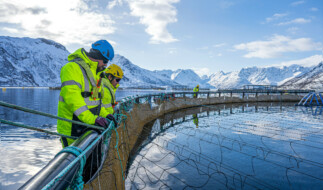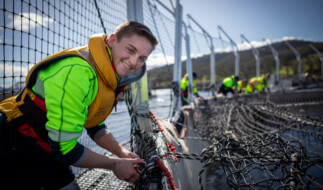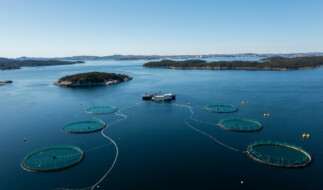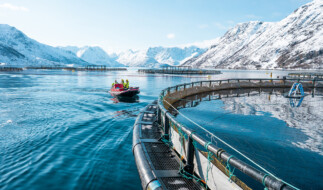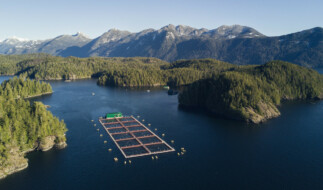The importance of vision when making tangible and lasting change
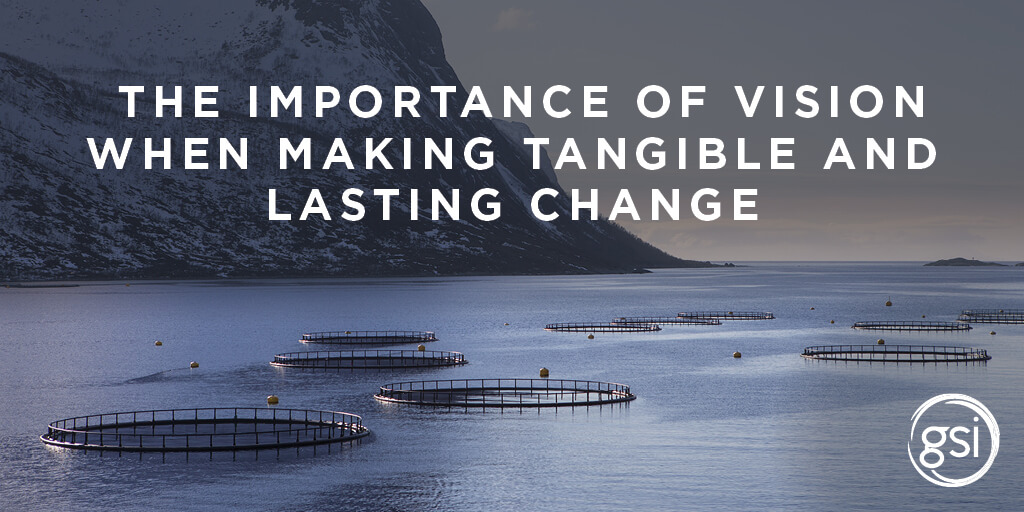
Echoing the words of The Nature Conservancy, we are committed to making 2020 a year of action, and a year of continuing to make path-defining choices for a better future and a more sustainable planet.
But as we look to the future, we first have to look at where we are now.
2019 will go down on record as the year of wildfires, climate strikes, and flooding. Like every sector, the salmon farming industry (and the food production industry at large), is at an inflection point—how to produce more healthy food while minimizing the impact on the environment. A challenge already, but a changing climate is adding even more pressure, and society, governments, and influential organizations are being forced to rethink current systems.
Therefore, 2020 must be the year of climate action, and the next 10 years must be known as the decade of change. The world’s most respected climate scientists are united when they tell us that to undo the most extreme scenarios of climate change, the time is now for coordinated, comprehensive climate action.
Our mantra for the past 6 years has been: business as usual is no longer an option; our food systems are under threat and need drastic change. Working independently or on a regional scale may address some challenges but it will not deliver significant change or address the challenges at the speed our food system requires. This is why our Global Salmon Initiative members have come together to find ways to disrupt current industry performance, and to create the change required to ensure that salmon farming, and aquaculture more generally, can continue to play an important role in sustainable food systems.
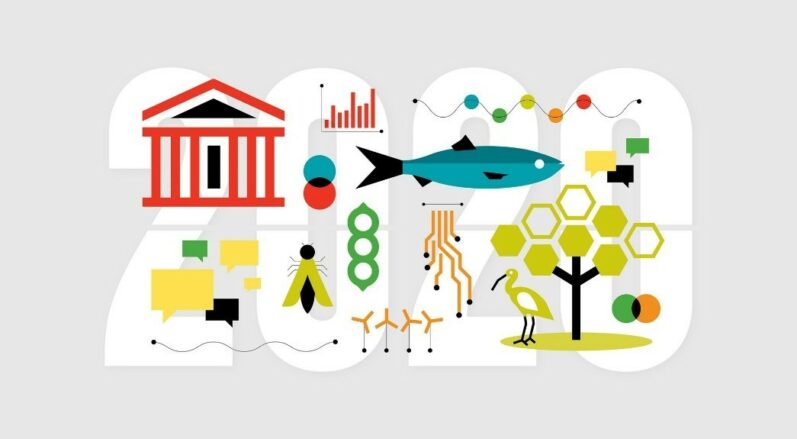
Reference: The Nature Conservancy: Five Changes to Change the World in 2020
So, what does our vision look like?
By scaling up aquaculture in a responsible manner, we can help to meet the growing demands for protein and fish and to alleviate pressures on wild fish stocks. By providing more responsibly produced seafood options, we can also support people in reducing their meat intake for planetary and health benefits.
To make this vision possible, we identified collaboration as a key driver to get us there at the speed and scale our planet needs. GSI unites 50% of the global farmed salmon sector and members of the fish farming industry value chain; at the same time, we continue to grow a global community of experts and partners to help us form a solution-focused and knowledge-sharing platform to find ways to tackle shared challenges to responsible aquaculture. Through this collaboration our members are developing and implementing advanced fish farming approaches and driving environmental improvements that will create long-term change for the sustainability profile of the sector.
2020 marks our seventh anniversary, and each year we find more momentum in our projects. This year, we plan to further develop and accelerate the delivery of our ambitious goals:
- Continuing on our path to 100% Aquaculture Stewardship Council ASC certification—we’re currently passing 65% for members who have been production certified—there is still a way to go.
- The launch of our annual sustainability report this May, which will include new additional indicators.
- We have a 3-day biosecurity technical workshop in April, and we will be using that time to bring together fish health experts from across the membership and globe to share best practices on fish health and welfare in salmon farming.
We also have some new additional projects in development, so watch this space!
Importantly, everything we do in 2020 will support the continued provision of a healthy and sustainable source of protein, while minimizing the environmental impact of fish farming and continuing to improve our social and economic contributions. We are constantly looking to other sectors, other food producers, as well as our own members, to find new ways of working; approaches that we can implement and share. We want to inspire other companies and other sectors to adopt a collaborative approach and make their own path-defining choices for the future.
The World Wildlife Fund recently published a case study on the GSI model and highlighted it as “the leading example of industry leadership in transforming an entire sector towards a more sustainable future.” We hope that we can be used as an example of how collaboration can help transform an entire industry and put it on a path to a more sustainable future.
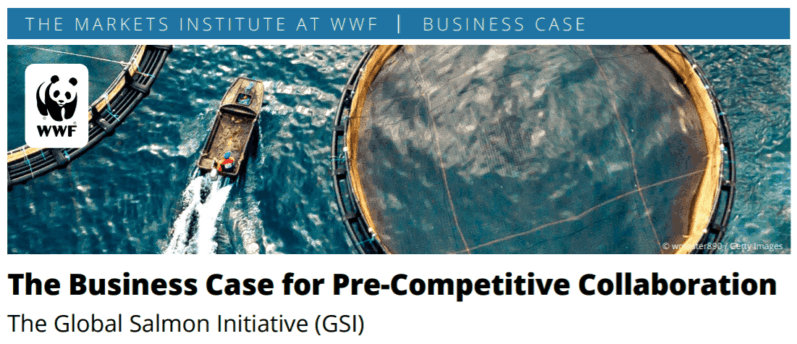
Reference: WWF: The Business Case for Pre-Competitive Collaboration: The Global Salmon Initiative (GSI)
Our road map for change
It’s clear: finding the solutions to solve the global food crisis is not beyond our capabilities. We know we can find solutions through innovation and collective problem-solving. For example, take the development of fish-free fish feed: 5 years ago, no one would have predicted that this would be a realistic development, but today it’s a reality. The issue is not working out what to do, but how can we find the solutions that are going to create significant, long-term change with the critical mass of change that is needed. Moving beyond individual solutions or top performers is key. If the majority of food production does not change and operate in a sustainable way, then the “good projects” are just an exercise in vanity and will not deliver the results required.
It is possible to close the food gap and to minimize the stress added to the world’s resources, but we must challenge ourselves to act responsibly, promote knowledge exchange to accelerate solutions, collaborate, and innovate. Our vision for 2020 is not just an idealistic outlook for the future, it is a road map of action and of change at speed and scale.
There is an awakening—a global realization that there is, without question, a critical link between sustainability, diet, and climate—and we need to collaborate across sectors to accelerate the rise of the conscious consumer to motivate them to make path-defining choices of their own. Farmed salmon is one of the most eco-efficient and sustainable forms of protein available. With a low carbon footprint, high protein retention, and an efficient feed conversion ratio, farmed salmon offers a healthy and climate-friendly protein source for the world’s food needs. Consumers can have an immediate impact by choosing only products that display the Aquaculture Stewardship Council logo, supporting environmentally and socially responsible seafood.
A bold example from Camanchaca
“The company’s forests have an estimated capacity to capture 14,000 tons of carbon annually. We will implement specific forest stewardship plans that could allow us to compensate as much as half of Salmones Camanchaca’s current footprint,”Alfredo Tello, Salmones Camanchaca, Technical and Sustainability Manager
GSI member Salmones Camanchaca is leading the way with its commitment to being carbon-neutral by 2025. To become carbon-neutral, Salmones Camanchaca will prioritize reducing its main sources of carbon emissions: fossil fuels, electricity, and refrigerants. To achieve this, the company will partner with suppliers to optimize processes and introduce new approaches to reduce emissions. The company will also balance its carbon emissions of its salmon farming activities by utilizing more than 1,000 hectares of forests that will be managed to maximize carbon sequestration.
